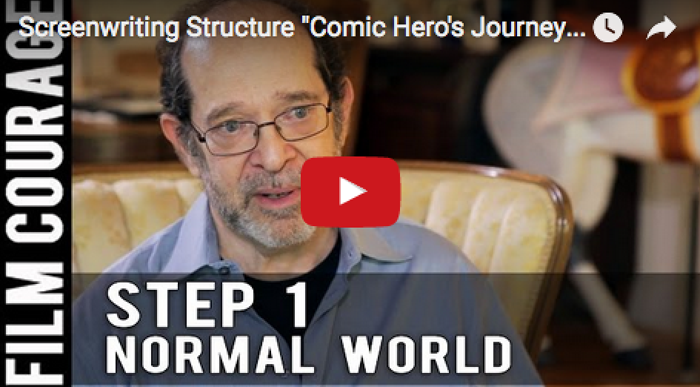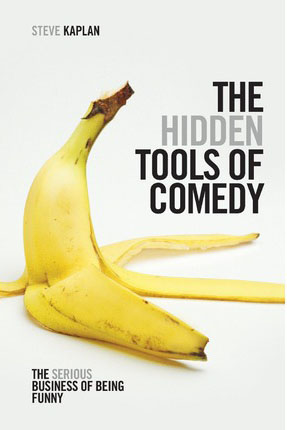
Watch the video on Youtube here
Steve Kaplan: After the Normal World you have the What the F*ck moment. The WTF Moment. And that is the essence of the comic premise. The comic premise is the idea that that something impossible or improbable happens, impossible in the sense of a man living the same day over and over again that’s impossible. Improbable that a somewhat out of shape, not too physical analyst could be put out to the field and do the derring-do that James Bond would that is not impossible but isn’t improbable [referring to SPY Movie].
So all comic premises revolve around the thought that this impossible or improbable moment happens and it asks the question what would happen then and the best comedies then develop that premise through character.
“So after you have the WTF moment, you have what we call the Reaction. Now in most comedies when the character is faced with a life-changing, life-altering impossible situation, most characters desperately try to claw back to the normal world.”

Watch the video on Youtube here
Paul Feig talks about how he wrote the script for SPY focusing not on what funny things he could do but what comic moments would come out of character of simply putting Melissa McCarthy’s character in these perilous situations and then seeing how she would cope, how she would grow, how she would become not only a better person but a more fully realized person of who she is.
So after you have the WTF moment, you have what we call the Reaction. Now in most comedies when the character is faced with a life-changing, life-altering impossible situation, most characters desperately try to claw back to the normal world.
Now remember, in the Normal World your characters are misshapen. Your protagonists are not who they want to be or need to be but they don’t know it. They are unaware of it. They turn themselves into a pretzel to try to convince themselves that they’re having a happy life. That their life is O.K. and when the comic premise occurs, that is all taken away from them. The rug is literally pulled out from under their feet. So in most Reaction sections there is a large part of action that is denial. The character is desperately trying to go back to the way they were before this occurred.
In TROPIC THUNDER for instance the WTF moment is Steve Coogan (the director) has taken Robert Downey, Jr. and Ben Stiller and all these other actors out into the country and the jungle because they’re making a Vietnam-era movie and he wants them to experience the country (Nam) and he accidentally steps on a landmine and blows himself up. And while some of the actors (especially Jay Baruchel) think “This isn’t part of the movie. This is not right.” Ben Stiller, the protagonist of the movie, is convinced that it is simply part of the director plan and he keeps on trying to go along and keep filming this Vietnam era movie. So he’s in denial that this has happened.
In GROUNDHOG DAY, Bill Murray spends the first day that he has relived in denial. He says “Is this still Groundhog’s day?” It’s only until the third day when he finally starts to then figure out what’s happening and how he can deal with it. So the first part of reaction is usually denial but the second part of reaction is starting to cope with the new situation but without any character development or personality development or personality change.
For instance, Bill Murray in Groundhog Day is kind of a jerk, so when he realizes that whatever he does will have no consequences for him he still is a jerk. He figures out that he can go talk to a girl and get some information from her. He can come back the next day, he’ll remember all the conversation but she won’t and he can pick her up and have sex with her. And thereby he has sex with all the women in Punxsutawney after a time. So you can see that he is dealing with the situation but really without any character growth.
For Melissa McCarthy, her reaction is both pain and sorrow because she loved Jude Law but it’s also anger and the sense that she has to avenge his death.
Jude Law gave her this terrible piece of jewelry that he put on a lanyard, a crazy cupcake that he gave to Melissa McCarthy and of course it’s a terrible idea to give this to a girl that is in love with you. But it becomes very important, symbolic touchstones, tangible touchstones are very important because you can say a lot with a little. So at his funeral or the memorial service for him at the CIA you can see Melissa McCarthy taking out crazy cupcake ceramic kind of touching it and you could tell that she’s trying to hold onto Bradley Fine played by Jude Law.
In another scene at the CIA when they realize that everybody’s cover has been blown and there is this nuclear bomb on the loose but none of her regular spies like Jason Statham’s Rick Ford can go after it. Melissa McCarthy takes out the crazy cupcake, holds onto it and quite out of character jumps out and says “I can go! They don’t know me.” Her reaction is that, even though she’s scared and even though she really doesn’t have any faith in herself. Because of her great love for Bradley Fine/Jude Law, she’s still going to do it.

Watch the video on Youtube here
So reaction is the moment when characters are still trying to deal with this impossible or improbable set of circumstances that they’re now trying to deal with and what happens in this sequence is your characters are given simple tasks and missions to try to get where they’re going to go or do what they’re going to do. For Melissa McCarthy in SPY, first she is sent to Paris and all she has to do is go into the office and spy on this bad guy who’s going to lead her to other bad guys who are going to lead her to the nuclear bomb. It’s that simple. She doesn’t have to become a super spy to do that. But because they’re on to her and because they have blown up the office building where she was supposed to be, one thing leads to another and there’s a series of discrete missions or tasks that she felt that she follows one after the other that lead her on the path to trying to recover the bomb, get the bad guys and then avenge her love, Jude Law and all the while she is doing this without her realizing it, she’s changing because what happens in a comedy (and you can argue almost any movie, but especially in comedies) because you’re starting with characters who are more than flawed, they’re broken, there is something wrong with them. You can absolutely see there’s something wrong Ben Stiller in Tropic Thunder because he’s an idiot. There is something wrong with Bill Murray in Groundhog Day, he’s a jerk! There is something wrong with Susan Cooper, Melissa McCarthy in SPY because she’s got no confidence. She has no sense of who she is. And because of this impossible situation that they’re now going to have to react to our characters that are transformed.
In a romantic comedy, it’s love that transforms a character. You know a psychiatrist will tell you that if you marry a jerk, 30 years later you have an older, fatter, bolder jerk. But in romantic comedies love is a magical power that is transformative. In Groundhog Day, it transforms Bill Murray from a jerk into a really good guy. And yes, he has to live through several lifetimes to get to be able to do that but still…
For Melissa McCarthy in SPY what’s transformative is even though she’s not aware of it, she’s been able to come up with new powers, new skills, and in reaction, is part of the movie in which new skills that have been hinted at in the normal world, new skills start to appear.
QUESTION: What is the “all is lost: moment in Groundhog Day and at what point in the movie does it occur?
Check out Steve’s Book – THE HIDDEN TOOLS OF COMEDY:
The Serious Business Of Being Funny
CONNECT WITH STEVE KAPLAN
Advertisement

Watch THE WEEKEND SAILOR on VOD January 10, 2017
THE WEEKEND SAILOR is a new feature documentary about the unexpected victory of the Mexican yacht Sayula II in the first crewed sailing race around the world in 1974. The most demanding sailing quest in history.
Sailor, Ramon Carlín visits his rebellious son, Enrique in the United Kingdom and comes across a magazine advertising a sailing race around the world. Although he had been sailing casually for two years, Ramon embarks on this race and brings his son along as an opportunity to not only teach him discipline but real life experiences as well.

Watch CATCH 22: based on the unwritten story by seanie sugrue – coming soon on January 17, 2017
Catch 22: based on the unwritten story by seanie sugrue: With Hurricane Sandy looming on the horizon, five hard-lived friends come to from a send-off celebration alongside an unexplained dead girl. What are friends for?

























